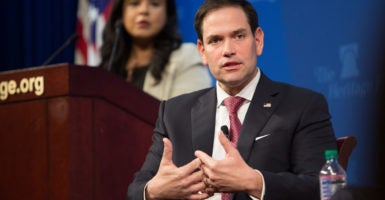Sen. Marco Rubio said Monday that the regime of Venezuelan President Nicolas Maduro isn’t a legitimate government, calling it instead a “criminal enterprise.”
Rubio, R-Fla., speaking at The Heritage Foundation, addressed the crisis in the South American nation, noting that some 50 other countries have joined the United States in recognizing opposition leader Juan Guaido as its acting president, even as Maduro, the dictator, clings to power.
There is “no Plan B,” said Rubio, chairman of the Senate Foreign Relations Committee’s Western Hemisphere subcommittee, adding that Maduro must go.
“This process we’re on is irreversible. None of these countries are going to come back around,” Rubio said at the event, also sponsored by the International Republican Institute. “There’s no way you get 50 countries to re-recognize you after what’s happened.”
As for the next step, Rubio said, it’s a mistake to view this as a U.S. action, when it’s an international effort. Most active in that regard have been Canada and Central American nations, he added.
“My No. 1 and No. 2 priorities are to get food and medicine to people who are starving to death, to infants who are dying in hospitals, to people who are waiting for HIV medications and anti-virals, that if they don’t get, they will die. That’s being blocked,” Rubio said. “The second [priority] is to continue to find ways to support the legitimate government.”
The Maduro regime is using the military to block humanitarian aid to Venezuelan citizens, using food and medicine as leverage over the population. That violates international law, the Florida Republican said.
Maduro began his second term in January after a disputed election fraught with allegations of fraud. The Venezuelan National Assembly invoked Article 233 of the country’s constitution to declare Maduro illegitimate, and Guaido, as head of the elected assembly, stood up to fill the void.
Maduro was part of the government of the now-deceased dictator Hugo Chavez, who he succeeded after his death in early 2013.
Rubio said the extent of theft by the Maduro regime in terms of stealing from the public treasury is almost unparalleled in modern times. But he noted an imperfect solution of letting many of those thieves—including Maduro and his closest allies—escape with ill-gotten gains might be needed for a peaceful transition. The Floridian cautioned that won’t always be an option.
“No one is more idealistic about these things than I am, but I also understand that sometimes in the history of humanity, you are forced to choose between two less-than-ideal options,” he said.
“You have to take the one that is least bad, and in this particular case, if the price of avoiding a bloodbath, or a civil war, or continued suffering is that a handful of really bad people who stole a lot money get to move somewhere else and live, that’s certainly preferable to a bloodbath,” Rubio said, adding:
But that’s an opportunity that they have to take with concrete action. That’s an off-ramp that doesn’t exist forever. The reverse is true. That is, if you don’t take that off-ramp, we know where your assets are.
We know where you’ve stolen and put the money, and you’re not going to have that if you continue to stick with Maduro. In addition to all the other challenges you’re going to face, your family is going to face the loss of all those assets for future generations.
That’s what I’m hoping for—that we’re going to wake up one day and find out some military leaders have recognized the rightful government, and Maduro is on a plane to somewhere.
In two instances, Rubio drew laughter when illustrating the problems facing Venezuelans.
“Their electric grid alone can cost up to $50 billion to rebuild,” Rubio said. “The other day, [Maduro] was holding a press conference at his palace. He said, ‘There’s no crisis in Venezuela,’ and the lights went out.”
He said Maduro and his associates “look like refrigerators” in a country where the much of the rest of the population is starving.
“Just think, there has never been a larger disconnect between a starving population and these overweight future cardiac patients,” Rubio said.































